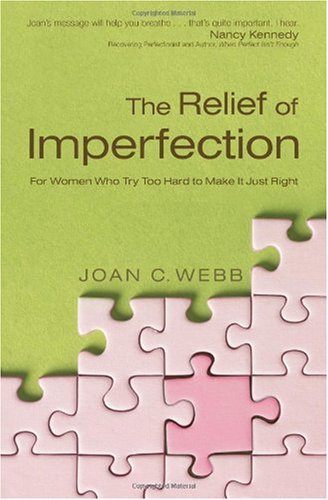
The Relief of Imperfection
So much of what Webb writes in this book is easy to relate to. Even if you don't consider yourself "perfectionistic," her words have depth and truth that I'm sure all women can relate to. While the book is Christian based with many Bible verses fluttering in and out of her text, it is a lot less Christ-focused than other Christian books I've read. This is a good and a bad thing. Sometimes I felt as if Webb is merely talking about perfectionism as a problem that women have that can't be solved, and sometimes I felt that she was talking about how perfectionism can be relieved by the truth that Christ has saved and forgiven. While I'm sure Webb meant the latter, sometimes I was a little lost as to how to get over perfectionistic tendencies. Overall, the book is specific enough to relate to but broad enough to realize that you must personalize the information given to understand the "how" part for yourself. Overall, she offers good advice that isn't too "trying to fix your problems" minded but is still realistic and helpful.
The book is neatly divided into sections such as "Imperfect Families and Relationships" or "Imperfect Churches and Culture." She divides the book up in chunks so that you can see the truth in all the areas that perfection takes over - and so you can see how imperfection marks all areas of life. At the end of each section, there is something called a "relief guide," which is basically a few pages of questions about the section to help you better understand the material and to personalize it. I did most of them, but not all. They were helpful and not too long. Being a perfectionist herself, Webb gives you the choice of not doing the relief guides, which I felt was really helpful. Often when I read a self-help book like this, I feel that I simply must do the workbook part or I'm not doing it right. Clearly, she thought with the mind of an over-doing when including that disclaimer :)
Webb offers a real glimpse at a totally overworked, over-trying life - the life she once had and is admittedly still recovering from. She admits to many faults of her own and shows how the Holy Spirit and a greater trust in the Lord has helped her become the better, less exasperated self that she is now. It's a relief hearing her story, knowing that God still loves us, despite how much we may over-try or even doubt ourselves. Her words are comforting, funny, and smile-able.
This book has had a huge impact on my understanding of that life is not perfect and that imperfect is okay. Those are two pretty big pills to swallow for someone who loves order, control, and for everything to be perfect. At the end of the book, I am not a recovered perfectionist. But neither is the author! She truly describes her life as always a work in progress, not striving for perfection in letting go of perfectionism, but embracing reality with the Lord on her side.
End Notes
This book is a great starting point for fellow perfectionists. I would even recommend it to people who don't consider themselves perfectionistic at all because there is a lot of truth about human nature in her words. You don't have to be a "perfectionist" to want perfection; you merely have to be human, which we all are. This book is something I plan to come back to later in life as well. There are a lot of great reminders about who God is not - a slave driver - and who God is - a lover of your soul, no matter what or how you do life. That basic idea helps shed the "perfect" skin that hides the imperfect inside. Understanding what areas of your life you try to perfect and how to combat those tendencies by replacing them with healthy habits and ideas, the road to lasting joy is near. This road also happens to be very imperfect.
Have you ever read a self-help book similar to this? Does this book sound like something you would read, even if you're not a "perfectionist" by nature?

No comments:
Post a Comment
I love hearing from readers! Feel free to share your thoughts :)